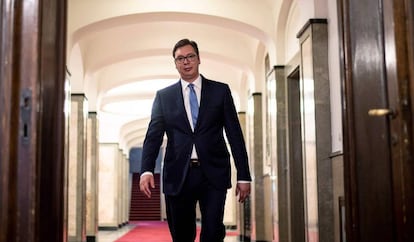“Putin is Serbia’s friend but he respects our path towards the EU”
President of Serbia talks to EL PAÍS about the Balkan country’s efforts to join the bloc, and how Kosovo is proving a sticking point


The existential journey that has taken Aleksandar Vučić to this point has been a long one. As a young man, the current president of Serbia was an ultra-nationalist of passionate rhetoric, and later he served as information minister under the dictator Slobodan Milosevic. Since then, Vučić has morphed into a fervent supporter of the European Union, and his mission now is to achieve membership for his country.
“Serbian society is kind of exhausted,” says Vučić, 48, in a personal interview conducted at the EU-Balkan summit held on Thursday in Sofia, Bulgaria. “We began the membership process in 2000 and we’ve been at it for 18 years. Let’s hope we’re ready to bring it to an end in 2025 [as the European Commission is proposing]. Although this is not a certainty; it depends on EU countries, and at the same time we’ve got Kosovo as an obstacle.”
Kosovo and Catalonia
In May, EL PAÍS interviewed Kosovo Prime Minister Ramush Haradinaj ahead of the EU-Balkan summit in Sofia. Haradinaj, who also wants his country to be admitted as a EU member, said he was aware that Spanish PM Rajoy is avoiding being seen with him to prevent any comparisons between Kosovo and Catalonia. Haradinaj rejected all comparisons between the two.
Kosovo is the great hurdle that the Serbian president will have to overcome. The region declared unilateral independence from Serbia 10 years ago, and the latter still claims the territory as its own. European nations feel that a bilateral agreement between both is a basic requirement towards EU membership.
“It’s not at all simple. There is still a lot of hatred [between Serbians and Kosovo Albanians] but we need to overcome it and try to find a compromise. If you ask me whether I am optimistic, I am not. But we’re still going to invest large amounts of effort to reach a compromise. I cannot guarantee that the other side will do the same,” he says, reaffirming his theory that Serbians are making a greater sacrifice in order to be accepted.
But Vučić is also facing significant reticence to the idea of EU membership back home. The Orthodox Church, which considers Kosovo to be the heart of Serbia and the spiritual cradle of its faith, has stated that if the price to pay for EU membership is to drop sovereignty claims over Kosovo, then it’s not worth it. Vučić says that he was hurt by those remarks: “They hurt very much. But the debate is not about with or without Kosovo...it’s about reaching an agreement and a solution.”
Where 25 years ago Vučić was exhorting Serbians to fight during the Balkan war, today he strikes a conciliatory tone. But what is his long-term vision? “I think that when you look at the future, what you want is enough jobs for young people. Otherwise there will be no future for us. We need to put our clashes, our fights behind us,” he says.
The Orthodox Church said that if the price to pay for EU membership is to drop sovereignty claims over Kosovo, then it’s not worth it
He is not speaking in a figurative way. Vučić believes that an armed conflict over Kosovo or any of the ethnic tensions that still exist in the region “would naturally kill Serbia.”
“We have had many wars that we did not want in the 20th century. We need to leave them where they are, and bring peace and stability to the entire region, and to Serbia as well.”
Standing two meters tall, Vučić does not walk in anyone’s shadow, and that extends to his political life as well: he trounced the competition in the first round of voting of Serbia’s presidential elections in April of last year.
A good political juggler, he is appreciated by German Chancellor Angela Merkel and simultaneously maintains close ties with Russian President Vladimir Putin. He has told the Financial Times that he takes Russian lessons for one hour every morning, and his favorite writer is Dostoyevski, which agrees with his personality. His favorite novel is The Brothers Karamazov, which he has re-read several times.
- Has Putin ever offered you a different path from the EU?
- Honestly, no. He is a friend of Serbia but he has always respected our choices.
Vučić is appreciated by German Chancellor Angela Merkel and simultaneously maintains close ties with Russian President Vladimir Putin
European leaders who are skeptical about letting Serbia join the union do not look favorably upon that friendship. Some of them feel that Serbia would be a Trojan horse sent by the Russians to erode Brussels from within. Vučić laughs at the idea, and says there is nothing wrong about being friends with the Russians.
“The Russians, like the Spaniards, support our territorial unity. If you come to Serbia and ask people who they prefer, Spaniards or Danes, 90% will say Spaniards. It’s got to do with the Kosovo issue,” says the president.
Spanish Prime Minister Mariano Rajoy did not attend the EU-Balkan summit, where there were Kosovo leaders present. This decision has been well received in Serbia, where Rajoy “is very popular, even though he might not care,” jokesVučić.
His political power goes beyond the institutions, as has often been the case in the history of his country. Last year he ran in presidential elections while serving as prime minister, and left the post to Ana Brnabic, a young technocrat who is openly lesbian. It was a move aimed at projecting a modern image of the country.
Vučić is occasionally criticized for his self-oriented excesses and his obsession for controlling the discourse in the press, where there is not a lot of plurality in the traditional media. But he does not see it that way: “I encourage it [purality]. Whatever it is that they say about me is sometimes the worst that they can say about anyone, even when they say that Vučić is gay (...) But of course we need to create a democratic space where they can work.”
One time, Vučić was nearly lynched. In 2015, he visited a memorial to the victims of the Srebrenica massacre, when 8,000 Muslims were killed by Serbian troops led by the war criminal Ratko Mladic. The local residents had not forgotten Vučić’s past, and they hurled stones, shoes and bottles at him, forcing him to flee the scene.
- Do you plan on returning there one day?
- Yes.
- Why?
- Because I don’t understand the people who attacked me. I don’t understand their feelings, their emotions. But I’m sure there will be an occasion to return when my position is respected. I will then pay tribute to the victims.
English version by Susana Urra.
Tu suscripción se está usando en otro dispositivo
¿Quieres añadir otro usuario a tu suscripción?
Si continúas leyendo en este dispositivo, no se podrá leer en el otro.
FlechaTu suscripción se está usando en otro dispositivo y solo puedes acceder a EL PAÍS desde un dispositivo a la vez.
Si quieres compartir tu cuenta, cambia tu suscripción a la modalidad Premium, así podrás añadir otro usuario. Cada uno accederá con su propia cuenta de email, lo que os permitirá personalizar vuestra experiencia en EL PAÍS.
¿Tienes una suscripción de empresa? Accede aquí para contratar más cuentas.
En el caso de no saber quién está usando tu cuenta, te recomendamos cambiar tu contraseña aquí.
Si decides continuar compartiendo tu cuenta, este mensaje se mostrará en tu dispositivo y en el de la otra persona que está usando tu cuenta de forma indefinida, afectando a tu experiencia de lectura. Puedes consultar aquí los términos y condiciones de la suscripción digital.








































